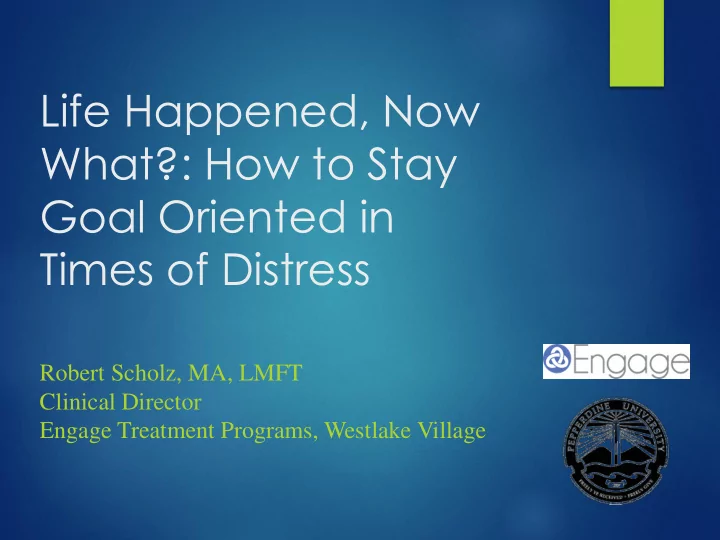

Life Happened, Now What?: How to Stay Goal Oriented in Times of Distress Robert Scholz, MA, LMFT Clinical Director Engage Treatment Programs, Westlake Village
What do you think? What are stressors in now? Ahead? What are the challenges in dealing with life?
Academics Money Family/ Missing Home Extra-curricular/sports/work---time management Relationship concerns Etc.
Bottom Line: Life is Hard Good to take advantage of resources available to you Good to learn skills that will help you with coping with your current and future challenges Each person’s story is infinitely unique but there are some skills that can help anyone — regardless of situation or problem
Goal: To be more resilient What is resilience? How would you define?
Resilience
“ Basically---resilience means the ability to “bounce back” after being ” stretched . - A MERICAN P SYCHOLOGICAL A SSOCIATION
4 Dimensions Physical Social Cognitive Mindfulness/Meditation/Mind- Quieting ** Combination of nature/ nurture
Physical Note — These are very basic, but often neglected, and very tied to mental health. Like what?
Physical Sleeping Eating Exercise
Sleep How many hours is good?
Sleeping 8-9 hours is best Did you get that last night? Do you wake up feeling rested?
But I don’t have time to sleep! Do you have time to get sick? Do you have time to waste reading/studying information that you cannot code and/or retrieve? Do you have time for more emotional distress, relational conflict, challenges to seem more overwhelming than they are, etc.? DON’T HAVE TIME NOT TO SLEEP!
Want to sleep but can’t? Consider these tips: Avoid caffeine later in the day Avoid heavy eating right before bed Exercise — but not right before bed Have some transition time---avoid screens or stressful material right before bed Try to maintain the same basic sleep schedule If can’t sleep --- get up! Don’t fight it.
Exercise Exercise can help promote resilience Aerobic exercise is especially good for mood struggles. Are you doing that? Getting aerobic exercise several days per week? What about something that relaxes you — like yoga or hiking?
Healthy Eating How would you guess diet is connected to mental health or mood?
Healthy Eating I’m not a dietitian, so won’t go into extensive detail here, but will remind you to watch Not eating regularly Not drinking enough water Eating too much junk food Over-doing it on caffeine
Social Coping Research repeatedly shows in the little annoyance of life and the huge stressors and losses, social support promotes resiliency.
Friends are important To share important concerns To get support To relax, laugh, have fun To play Academic journey is a marathon more than a sprint. Make time for friends.
Healthy Thinking What kinds of thoughts would help a person resilient? What kinds of thoughts do you think interfere or add to the problem?
Expecting challenges as a part of life vs. being shocked that your life doesn’t go smoothly Learning to rally and have a “This too shall pass” perspective
Avoid Rigid Thinking Perfectionism All-or-nothing Catastrophic thinking
Avoid Critical Thinking Don’t insult self Watch inner dialog Realizing thoughts are not always reality--- Try “I’m having the thought that…[I’m going to fail]”
What is your mindset Fixed mind set Growth mindset Life Sucks It’s never going to get better. I know I’m going to fail I just can’t take it anymore.
Thinking grateful thoughts Simply choosing to write down 5 things a day that you are grateful for can improve Psychological well-being---mood, energy, etc Physical well-being---sleep, fewer symptoms Social well-being — better relationships
Mindfulness Intentional, purposeful Opposite is mindlessness Self-aware Present Problem-solving E.g., I am feeling anxious. I am going to turn off this news show and go for a walk. On walk notice flowers, birds, etc.
M I N D F U L N E S S M E D I T A T I O N DISCRETE PERIODS OF MEDITATION OFTEN FOCUSED ON PAYING ATTENTION TO BREATH, BODY, AND THE PRESENT MOMENT.
Guided meditations Online options Marc.ulca.edu Franticworld.com Let’s do one of these now ---- Franticworld.com---Go to guided meditations Mindfulness meditation of body a breath https://www.youtube.com/watch?v=AvZB5sHZLFE FOREST RIVER GUIDED Meditation to let go
M I N D F U L N E S S R E S E A R C H POSITIVELY AFFECTS BRAIN PATTERNS UNDERLYING DAY-TO-DAY ANXIETY, STRESS, DEPRESSION, AND IRRITABILITY REGULAR MEDITATORS SEE DOCTORS LESS OFTEN; SPEND FEWER DAYS IN HOSPITAL MEMORY IMPROVES, CREATIVITY INCREASE, REACTION TIMES BECOME FASTER.
So Assess Yourself…Where Can You Improve? Physical Health? Social Connectedness? How You Think? Living in the Present?
Final Thoughts Your Resilience is Dynamic…things can get better. Do Something! Remind Yourself that these changes are connected to Your Goals Seek Help if you’re struggling Teachers Counselors Mentors Therapists
Recommend
More recommend